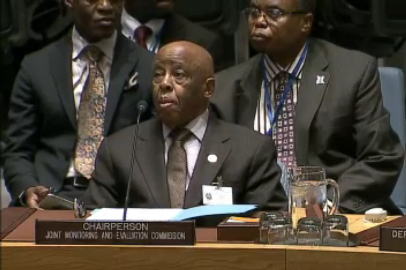Respect ceasefire, peace monitors tell S. Sudan warring parties
January 22, 2018 (JUBA) – The two main warring factions involved in the South Sudanese conflict should respect the ceasefire agreement they signed on 21 December last year, the chairperson of the Joint Monitoring and Evaluation Commission (JMEC) said on Monday.

“[The] CTSAMM [Ceasefire Transitional Monitoring Mechanim] has and will continue to report any verified violations of the ceasefire, either in terms of specific acts of violence, military movement or any other actions that contravene the terms of the Agreement. Where necessary and where proven, CTSAMM apportions blame and responsibility as appropriate,” partly reads the statement.
Mogae called on the warring factions in the conflict in South Sudan to fulfill their obligations to the CTSAMM, which monitors the truce.
He said the CTSAMM is actively monitoring and investigating a number of incidents and movements around the East African nation.
“It remains the responsibility of all parties signatory to the Cessation of Hostilities Agreement to uphold their obligations to ensure unrestricted access to CTSAMM ceasefire monitors so that they can accurately and speedily report on the situation around the country,” said Mogae.
According to Article 4 of the ceasefire agreement, “the parties shall not carry out unwarranted verbal or physical attacks against the CTSAMM, JMEC, IGAD [Intergovernmental Authority on Development], AU [African Union], UN [United Nations] or any other entity associated with implementation of this agreement.”
Signed on 21 December in Addis Ababa, Ethiopia, the ceasefire deal was broken immediately after it took effect on 24 December.
Each of the warring factions in the war-torn nation blamed the other for violations, despite previous agreements suffering a similar fate.
Mogae, however, said CTSAMM teams are the direct representatives of the IGAD and the wider international community in South Sudan and as such they must command the parties’ total cooperation.
“It remains the responsibility of all parties signatory to the Cessation of Hostilities Agreement to uphold their obligations to ensure unrestricted access to CTSAMM ceasefire monitors so that they can accurately and speedily report on the situation around the country,” he said.
Tens of thousands of people have been killed and more than two million displaced in South Sudan’s worst-ever violence since July 2011. In August 2015, a peace accord signed between the rival leaders led to the establishment of a transitional national unity government in April, but was shattered by renewed clashes in July 2016.
(ST)
